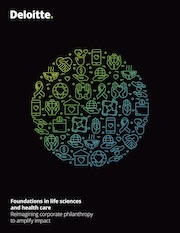All Funders
Tax Exempt Organization Search helps users find information about a tax-exempt organization’s federal tax status and filings.
Media Impact Funders partnered with Harvard University’s Shorenstein Center on Media, Politics and Public Policy to produce this case study report that surfaces pioneering funding practices in journalism.
For philanthropy to advance equity in all communities, especially low-income communities and communities of color, it needs to be able to understand the demographics of the organizations being funded (and declined), the people being served and the communities impacted. That data should be used to assess practices and drive decision making.

In this paper, they examine the current health ecosystem, evolving stakeholder expectations, the unique position of life sciences and health care foundations to effect critical change,and alternative engagement models with demonstrated track records of success on an international scale.
This publication provides a wealth of background and program ideas for improving rural mobility through existing and emerging technology. It offers insights about what’s already working and what is possible from the perspective of providers and thought leaders. It is a general introduction tailored for funders but useful for anyone. It does not require a background in technology or aging.
This annual report reveals results of a research study about food insecurity among older adults in the United States. Released by the National Foundation to End Senior Hunger (NFESH) and Feeding America, the study results offer data from the most recent year for which it is available, 2016, and reveals that more older adults faced hunger at this time than before the Great Recession.
Many foundations are adopting new approaches for supporting social change—approaches that aim to create impact at scale and change systems. As foundations embrace a wider variety of approaches, the roles that foundation staff members play must also change.
Based on in-depth conversations with 114 practitioners representing 50 foundations, Being the Change explores how foundations are rethinking staff size, backgrounds, roles, and culture to better serve their ambitions for social impact.
This publication is a companion white paper to Mobility & Aging in Rural America: The Role for Innovation: An Introduction for Funders. It examines rural mobility through a lens of technology and across a longer timeframe.
A CNJG member queried our listserves on what online grants management system members use and would recommend for a small foundation. CNJG compiled these responses, and listed the different systems that members do use.
This report from the TCC Group finds that the flexibility, nimbleness, and willingness to collaborate demonstrated by the philanthropic sector over the past year in response to a rapidly changing policy environment could serve as a model for the sector going forward,
